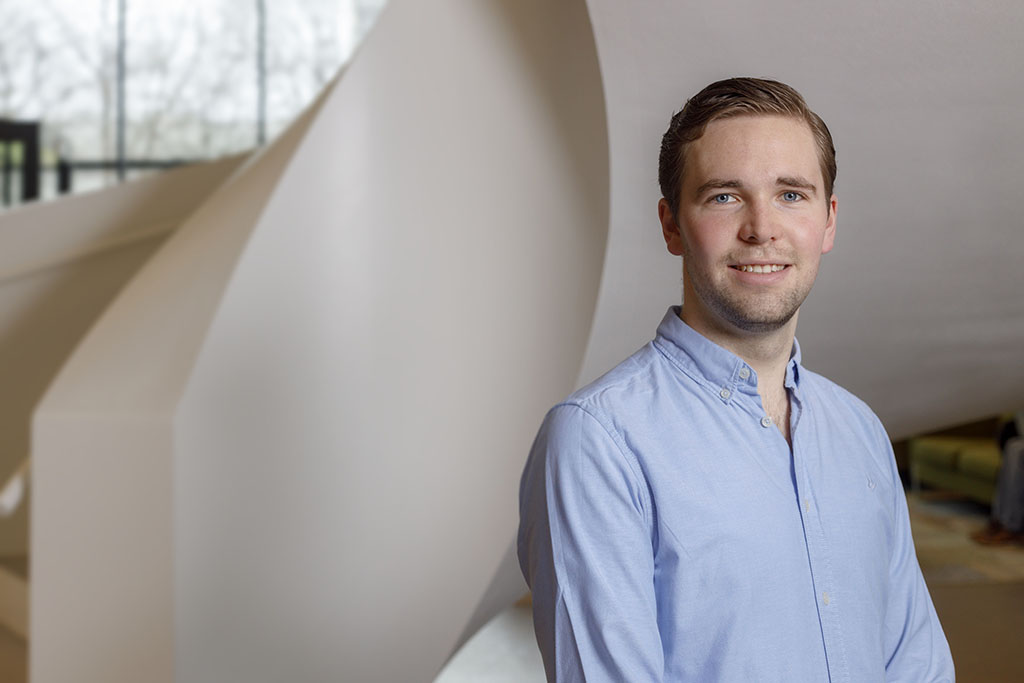Tilburg economics student helps former ministers get small parties out of the House of Representatives
What would the introduction of an electoral threshold mean for the distribution of power in the House of Representatives? It seemed like a great topic for Berend Holwerda’s Bachelor’s thesis in Econometrics and Operations Research. It was, and more. The thesis has been completed, but he is far from done with the subject. Now he is working with former ministers on a follow-up study.

Sixteen parties, plus four one-person party. The power in the House of Representatives has become a bit divided, to say the least. And forming a coalition is no longer so easy as a result. The introduction of a higher electoral threshold, making winning a certain number of seats a prerequisite for entering the House, is one way to change that.
Holwerda calculated what the introduction of a five percent electoral threshold would mean for the proportions in the House. This shows that in addition to the disappearance of small parties, the largest parties will benefit more from the distribution of residual seats.
Berend Holwerda is not the only one interested in introducing such a threshold. A petition (in Dutch) for this was also started in late December. Initiators include former Tilburg University Board president Yvonne van Rooy, economics professor Barbara Baarsma, and former education minister Jo Ritzen.
‘I think it would be incredibly cool to go to The Hague and submit that petition’
Holwerda: “I was working on my thesis one afternoon in December when I read in a report in the AD that a petition had been started for an electoral threshold. I then left a message on its site, very noncommittal, that I was working on a thesis on that topic. A few weeks later I got a message back from Jo Ritzen.”
“He’s an incredibly busy man, so nice that he responded to my message. I didn’t know Jo Ritzen myself before we got in touch, but I was talking to my father about it and he immediately said, Oh! And of course my supervisors here at the university knew him too. He is an incredibly wise and learned man, which is also what makes it so interesting to talk to him about this.”
Helping with the campaign
That first message from Jo Ritzen (former minister, former Maastricht University Board president and economics professor) led to more contact. About the thesis, about an electoral threshold, about the campaign, and about further research. It did not benefit Holwerda in finishing his Bachelor’s thesis. The benefit is mostly for the other side. Holwerda was, in fact, roped to help with the campaign and do further background research for the committee.
He is also now more convinced of the importance of introducing an electoral threshold. “With my thesis I didn’t want to say that it should happen, the most important thing is that there is a debate held about it. After talks with Jo Ritzen, I also think that it is really good to introduce an electoral threshold. To follow everything that happens in the House of Representatives, political parties have to be large enough.
“Within small parties it is difficult to have substantive input on every issue. In addition, for these small parties, profiling is much more important. This is at the expense of the quality of the debate. Therefore, I think it is important for parties to be bigger. It would be better if that were not necessary, but it is necessary.”
Impact
“A thesis with impact? That might be too big a word. Socially relevant, it is. I always missed that a bit in mathematics. Before I started my thesis I did a board year at MAK, I also noticed there that I like it much better when it’s socially relevant.”
In terms of the future, too, his thesis and its aftermath have given Holwerda’s life some direction. “I’m not politically active, but I’ve always found it interesting. Now it’s slowly becoming a little more alive. In any case, it seems incredibly cool to go to The Hague soon and present the petition. Maybe that’s why I chose to major in Economics. It’s not immediately political, but it does go a bit in that direction.”
In retrospect, Holwerda says, one thing about his thesis he would have preferred to do differently. In the calculations, he assumed a fairly high threshold of five percent of the vote to gain access, but with the knowledge of today, he would have preferred to assume a threshold of two percent, which the petition also calls for. But, of course, that can always be recalculated. Otherwise, it was just all top-notch.
“Everyone dreads the thesis. But if you have something that’s interesting, it can actually be a lot of fun. That’s what I loved about this. That’s what I hope to pass on to others. It can just lead to great things. My thesis has also been read by others. They found it interesting. A political scientist from Amsterdam gave me tips for follow-up research. I get to meet very interesting people. Who knows, maybe it will lead somewhere. Maybe it won’t, we’ll see.”
Translated by Language Center, Riet Bettonviel






